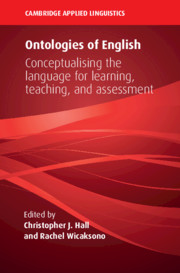Book contents
- Ontologies of English
- The Cambridge Applied Linguistics Series
- Ontologies of English
- Copyright page
- Dedication
- Contents
- Figures
- Tables
- Contributors
- Series Editors’ Preface
- Acknowledgements
- Transcription Conventions
- Part I Introduction
- 1 Approaching Ontologies of English
- 2 An Ontological Framework for English
- Part II English in/for L2 Learning and Teaching
- Part III English in Schools
- Part IV Assessing English
- Part V English in Lingua Franca Contexts
- Part VI English and Social Practice
- Part VII Commentary and Conclusions
- Index
- References
1 - Approaching Ontologies of English
from Part I - Introduction
Published online by Cambridge University Press: 24 December 2019
- Ontologies of English
- The Cambridge Applied Linguistics Series
- Ontologies of English
- Copyright page
- Dedication
- Contents
- Figures
- Tables
- Contributors
- Series Editors’ Preface
- Acknowledgements
- Transcription Conventions
- Part I Introduction
- 1 Approaching Ontologies of English
- 2 An Ontological Framework for English
- Part II English in/for L2 Learning and Teaching
- Part III English in Schools
- Part IV Assessing English
- Part V English in Lingua Franca Contexts
- Part VI English and Social Practice
- Part VII Commentary and Conclusions
- Index
- References
Summary
This book is about the ways in which English is conceptualised in and for the domains of language learning, teaching, and assessment. Examining and being explicit about what we, as applied linguists, think English is – our ontologies of English – and how these ontologies underpin our educational ideologies and professional practices, should be an essential component of research in the discipline. Yet the nature of the ‘EL’ in ELT does not feature anywhere nearly as much as the ‘T’, and how English is conceptualised in schools tends to be debated more by educationalists than applied linguists. Teachers, learners, policy makers, and other stakeholders do have strong beliefs about what counts as English, who it belongs to, and how it should be taught, learned, and tested. In research we conducted with colleagues at a university in China (Hall et al., 2017), English teachers told us about the ways they conceptualised English as a global language and, more narrowly, as the subject they taught to undergraduate students.
Keywords
- Type
- Chapter
- Information
- Ontologies of EnglishConceptualising the Language for Learning, Teaching, and Assessment, pp. 3 - 12Publisher: Cambridge University PressPrint publication year: 2020
References
- 1
- Cited by



